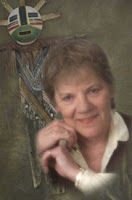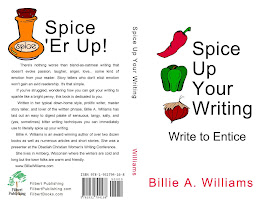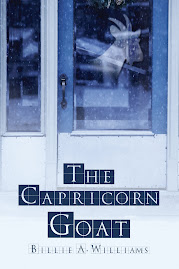
WHAT ABOUT FEEDBACK?
WHAT ABOUT NEGATIVE FEEDBACK?
by Billie A Williams ©2007
We have a tendency to think anything negative — is—well, negative. Did you ever s top to think that it probably has more to do with YOUR attitude than the feedback? Jack Canfield has been my mentor this week, as you no doubt can tell, and boy does he ever change your attitude about things.
top to think that it probably has more to do with YOUR attitude than the feedback? Jack Canfield has been my mentor this week, as you no doubt can tell, and boy does he ever change your attitude about things.
Let’s take negative feedback – such as we might get with a rejection. What if you were to take a look at that rejection, that negative feedback and say: “Hey, this is information that I can use. This is information about an improvement opportunity.”
Say what? An improvement opportunity? Ask yourself these questions.
Does caving in and giving up gain you your objective, your goal?
WHAT ABOUT NEGATIVE FEEDBACK?
by Billie A Williams ©2007
We have a tendency to think anything negative — is—well, negative. Did you ever s
 top to think that it probably has more to do with YOUR attitude than the feedback? Jack Canfield has been my mentor this week, as you no doubt can tell, and boy does he ever change your attitude about things.
top to think that it probably has more to do with YOUR attitude than the feedback? Jack Canfield has been my mentor this week, as you no doubt can tell, and boy does he ever change your attitude about things.Let’s take negative feedback – such as we might get with a rejection. What if you were to take a look at that rejection, that negative feedback and say: “Hey, this is information that I can use. This is information about an improvement opportunity.”
Say what? An improvement opportunity? Ask yourself these questions.
Does caving in and giving up gain you your objective, your goal?
No it keeps you stuck in the same place you were before you got it.
Does getting mad at the source of the feedback pull you out in front of the pack?
No—it pushes the person away from you. They tried to help or tried to guide you and you rejected them as a person instead of looking past the anger to see what they were saying.
Does ignoring the feedback get you closer to your goal?
That is a loaded question because you do need to weigh the feedback you are getting. If it seems right, after you analyze it in a non-combative state of mind, then you owe it to yourself to incorporate it into your path toward your goal.
You need to think of feedback as correctional guidance, as a steering force in your pursuit of that brass ring – whether that is publication, an agent, a 6-figure contract with a big-name publishing house or the New York Times Best-Seller list
Be willing to ask for feedback. If you don’t ask for it, you may be missing the opportunity to improve what you have. Make a good novel great—a good attempt a breakout best-seller. Don’t be afraid to ask. When you do ask LISTEN with all your heart and mind. “Feedback is the gift that helps you be more effective,” says Jack Canfield.
He also cautions that not all feedback is accurate. One test he recommends is looking for patterns. If several people are telling you the same thing you may as well accept that there is likely some truth to it. Would you rather stand your ground and feel you are right? Or, would you rather be successful? Accept feedback, use it to build by reconstructing, re-thinking what you are trying to do.
Responding to being off course, or your reaction to that feedback…So what do you do once you get some feedback?
You need to think of feedback as correctional guidance, as a steering force in your pursuit of that brass ring – whether that is publication, an agent, a 6-figure contract with a big-name publishing house or the New York Times Best-Seller list
Be willing to ask for feedback. If you don’t ask for it, you may be missing the opportunity to improve what you have. Make a good novel great—a good attempt a breakout best-seller. Don’t be afraid to ask. When you do ask LISTEN with all your heart and mind. “Feedback is the gift that helps you be more effective,” says Jack Canfield.
He also cautions that not all feedback is accurate. One test he recommends is looking for patterns. If several people are telling you the same thing you may as well accept that there is likely some truth to it. Would you rather stand your ground and feel you are right? Or, would you rather be successful? Accept feedback, use it to build by reconstructing, re-thinking what you are trying to do.
Responding to being off course, or your reaction to that feedback…So what do you do once you get some feedback?
Acknowledge and accept that you actually did the best you could with what you had at the time. That includes your skills, your knowledge, and experiences.
Look back on what you have done so far. You survived. You can cope with the end result so far…you have finished your manuscript, it needs work – you can survive that. You can re-do with constructive feedback, make it what you thought you had created — a piece of work that will garner respect and admiration for your talents.
Write down everything you learned from the experience, your insights, your lessons and ways that you can do it better next time. Or, in the case of this manuscript tweak it until it sparkles with your very best work.
Now here is a biggy!
Thank everyone for their feed back and insights. Gratitude is the most significant Karma you can cultivate. If that feedback is hostile feedback, use what you can and dump the rest, but thank that person for their time, and consideration, their willingness to give you their opinion.
Another caveat, do not try to hide failure. Clean up the mess, apologize if it’s necessary – and move on. This probably would apply to other areas more than writing except if you’ve done sloppy research and purported facts that weren’t true etc.
Take time to go back and review your successes. Sometimes, negativity seems to hit you below the belt and you owe it to yourself to review the good that you’ve done and do. Regroup and spend time with some positive, loving friends, family and coworkers who can reaffirm your worth and contribution. The very fact that someone likes and cares about you is enough to rebuild your faith in yourself.
Now that you’ve wallowed in some good vibes its time to refocus on your vision, your dream, your major goal. Incorporate the lessons you’ve learned. Recommit to a new plan of action to get you on course and out there. You are ready – so do a Nike™!
JUST DO IT!














